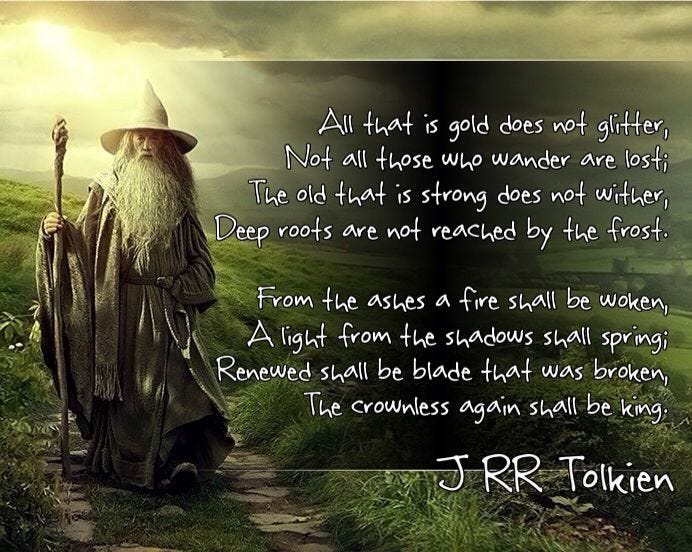A recent review of The Way Home, available now:
The Way Home is for those still suffering… lost in that interior wood, maybe feeling alone and longing for a hand to reach out from a valley in their lives. This book is/can be that hand, or at least a channel of that peace, a conduit through which a bigger greater source wants us to be whole and at home - not just for ourselves, but for those we care about, and for the health of the world.
I recently watched the three-part docudrama series Testament: The Story of Moses on Netflix. While it is not spectacular on a few levels, I enjoyed hearing the reflections of faith leaders and scholars from the three Abrahamic religions (Judaism, Christianity, and Islam) about this monumental figure of the ancient world. I was re-inspired by the life of Moses and I’ve been thinking a lot lately about this prince-shepherd-prophet.
Since Moses is on my mind, I thought I’d share ten lessons for life—actually, let’s call them Ten New Commandments—from his hero’s journey. These carry relevance for all of us, regardless of our religious backgrounds or traditions.
Let me know in the comments which commandment resonates with you!
1. You are not defined by your worst day.
Moses murdered a man. But we don’t call him “Moses the murder.” He experienced redemption. He received a divine call. He led the Israelites out of slavery and into freedom.
This lesson was echoed the other day as I attended a screening of “Correcting the Narrative,” a film series that highlights the successes, humanity, and agency of people with criminal records. One of the panelists posed a question for the audience to consider: “No one ever defines you by the worst thing you’ve ever done, so why do we think it is okay to treat formerly incarcerated individuals that way?”
Maybe it isn’t someone else, but maybe you define yourself by your worst moment or biggest failure or greatest mistake. If that’s the case, Moses is a powerful example of the fact that you are not your errors and that the rest of your story is yet to be written… So what is the new story that you want to tell with your life?
2. Be open to mystical experience.
Moses has a divine encounter with a burning bush in the wilderness. This is how he receives his marching orders to go to Pharaoh and bring the Israelites out of Egypt. In a mystical experience. And he continues to move through the world in this way—knowing God “face to face.”
Being open to mystical experience—supernatural encounters, spiritual realities, synchronicities, and signs—is one of the main things I write about in The Way Home. We all have these sacred (and often ridiculous!) moments in our lives that are trying to reveal something, to teach us, to guide us. All we have to do is pay attention.
The next time you think the universe might be trying to deliver you a message, what do you have to lose? Why not give it a try and see where it leads?
3. Know where you come from.
I appreciated how the Testament series reflected on the various parts of Moses’ identity. A Hebrew, born to an Israelite woman. An Egyptian, raised by Pharaoh’s daughter. A shepherd, married to the daughter of a shepherd and priest. These different identities would have pulled him in different directions. He would have had to wrestle with these parts of himself.
Each of us is composed of many parts. Knowing where you come from means being honest about the different forces that have shaped you, for better or worse. When we can be real about our story, we can carry forward the best aspects of our individual, familial, communal, and cultural background, and leave behind the harmful parts, ensuring that we don’t hurt others because we are living unexamined lives.
4. Own your flaws.
Moses tried to excuse himself from the mission by naming his deficiencies: “Pardon your servant, Lord. I have never been eloquent, neither in the past nor since you have spoken to your servant. I am slow of speech and tongue.”
Rather than rule him out, however, this self-awareness about his flaws made him the right person for the job! He wasn’t arrogant, domineering, or self-centered. He carried himself with humility.
Acting perfect doesn’t help you. “Fake it ‘til you make it” only gets you so far. Ultimately, an awareness of your limitations is healthy because it keeps you open to the necessary support and contributions of others, which leads us to the next commandment…
5. Don’t go it alone.
Ignoring Moses’ excuse about not speaking well, God says “[Your brother Aaron] can speak well. He is already on his way to meet you.”
In other words, Moses needs help to liberate the Israelites. He gets it from Aaron and their sister Miriam too.
Getting help is a fundamental aspect of the hero’s journey to wholeness. It is a critical part of answering any call. To grow and evolve, help from others is always necessary.
What do you need help with right now? Who do you need help from?
6. Allow yourself to wander.
Moses’ life has multiple periods of wandering. First, the “long period” as a fugitive and shepherd over his father-in-law’s flock. Second, the longer period of forty years leading a grumbling group through the wilderness en route to the Promised Land. Both of these were seasons of preparation, making Moses and the people into who they’re meant to be.
It is easy to think that wandering is a waste of time. We want to get from point A to point B as fast as possible.
But wandering works on us.
It works within us, helping us learn and grow. It also works around us, preparing things along our path.
Remember, as Gandalf writes to Frodo, “Not all who wander are lost.”
7. Give yourself to a bigger story.
After his murderous mistake, Moses went into hiding. A life of self-protection and self-preservation.
But he was born for a bigger story.
We all are.
The most meaningful life is found in being about something beyond yourself.
Not pleasure. But purpose.
Not selfishness. But service.
Consider: how is your life bringing liberation to others?
8. Be persistent.
Again and again Moses went to Pharaoh, after each devastating plague, as God’s messenger declaring, “Let my people go.” But Pharaoh refused.
Moses, however, didn’t give up.
He persisted and, ultimately, his people gained their freedom.
Achieving what you are called to and calling for doesn’t happen overnight.
It requires resilience in the face of resistance.
It takes persistence to fulfill your purpose.
9. Live in alignment with who you really are.
Moses famously shatters the stone tablets (on which the Ten Commandments are inscribed) when he comes down from a mountaintop meeting with God and sees the Israelites worshipping a golden calf.
Moses breaks the tablets because his heart is broken. The people he is leading aren’t living in alignment with who they say they are.
This is the true role of a prophet. Not judging others or predicting things about the future, but calling people into the best, fullest versions of themselves. Reminding people of who they really are.
Be a prophet.
Encourage and empower people into wholeness.
10. Trust that the way will open.
One of my favorite childhood Bible stories is the parting of the Red Sea. The fleeing Israelites, with Pharaoh’s army hot on their tail, have run into a dead end. But then a way is made where there is no way…
Then Moses stretched out his hand over the sea… The waters were divided, and the Israelites went through the sea on dry ground, with a wall of water on their right and on their left.
-Exodus 14:21-22
When you are truly called to something, there’s no such thing as no way out.
You won’t know how everything will work out, but you can know that everything will work out. Just take the next right step. And eventually what looked like a dead end will open wide into a way forward.
As Joseph Campbell said, “Follow your bliss and don’t be afraid, and doors will open where you didn’t know they were going to be. If you follow your bliss, doors will open for you that wouldn’t have opened for anyone else.”
So there you have them, Ten New Commandments.
What lands with you?
Which one do you need to follow right now?





